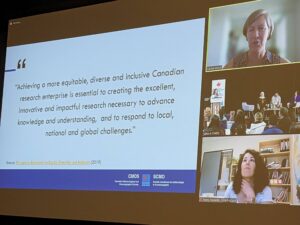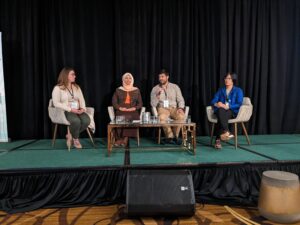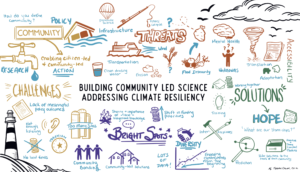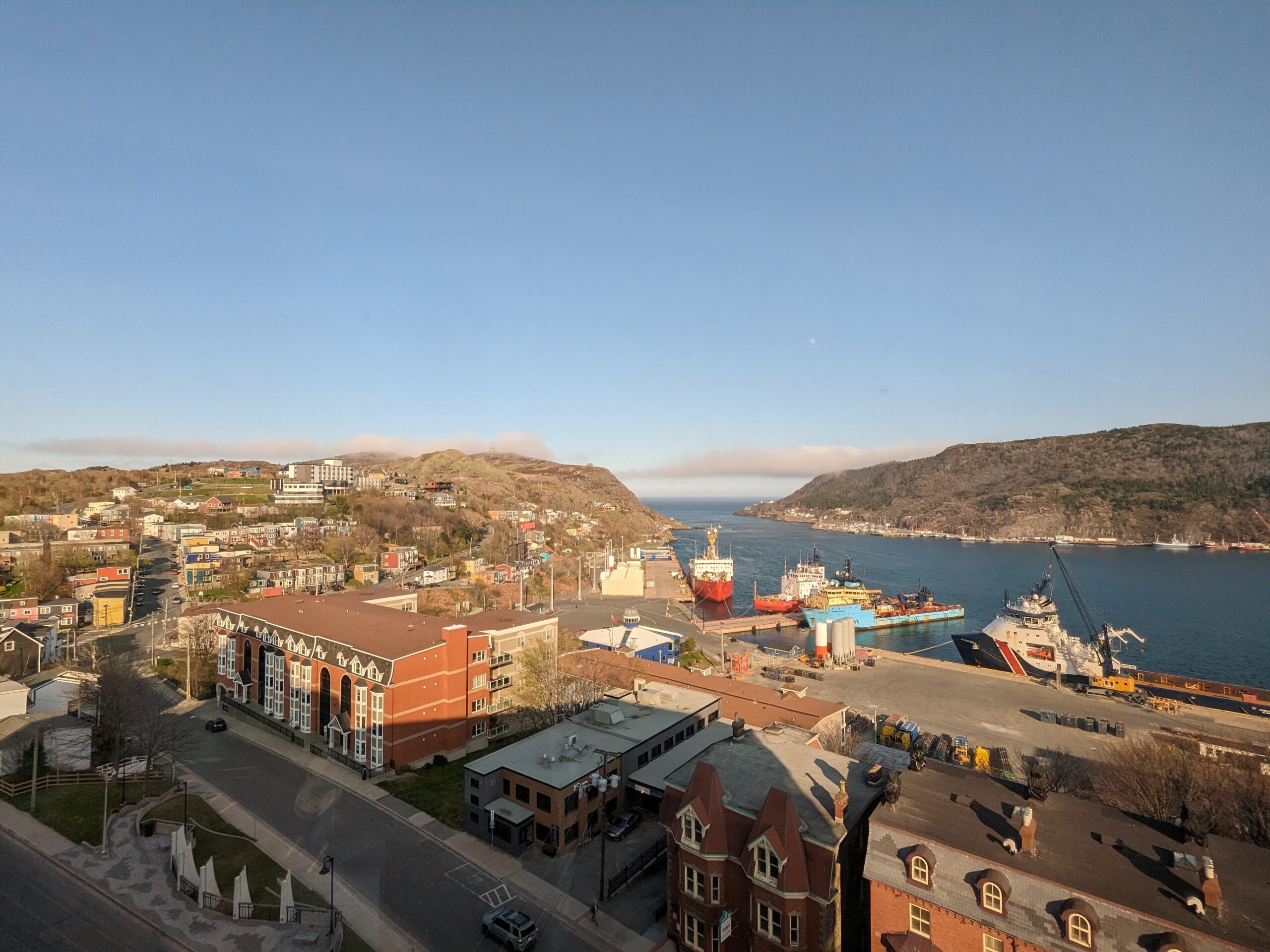
Photo of the St. John’s Harbour in Newfoundland by Alexa Goodman
MEOPAR was busy at ORCA’s National Meeting advancing action on the UN Decade of Ocean Science hosted in St. John’s, NL on June 1-2 in conjunction with CMOS’ 57th Congress. At ORCA, MEOPAR held four sessions and presented four posters, in addition to supporting Jonathan Kellogg from Tula Foundation in facilitating two breakout sessions on the Predicted Ocean. MEOPAR also supported CMOS’s Education Day and EDIA Panel Discussion.
Here’s a look at how MEOPAR advanced collaboration and ocean science research towards the UN Decade of Ocean Science during these two days.
Photos by Alexa Goodman
Earth, Ocean, and Space Science by and for Everyone: Panel discussion on Equity, Diversity Inclusion and Accessibility (EDIA)
As part of the CMOS Congress, leading scientists and practitioners Gerald Singh, Fanny Noisette, Stephanie Arnold, Hind Al-Abadleh, Karine Morin, and Alexa Goodman discussed equity, diversity, inclusion, and accessibility (EDIA) along with 150 participants (pictured right).
Building on CMOS’ EDIA report, they identified many threads affecting science, careers, and accelerators that can help us overcome barriers to inclusion. During the session, practitioners were encouraged to make room for, celebrate, and uplift marginalized voices. In addition, they were encouraged to develop projects that place people and communities first. Mentorship and community involvement were recommended for underrepresented groups seeking opportunities.
The panelists advised allies and dominant groups to make space for others and continue their (un)learning journey through EDIA training. For transformative EDIA action, participants were urged to hold leaders accountable, rethink how we define diversity in research excellence, and move towards blended approaches to measuring success.
Art-Science Symbiosis: Reach new horizons by integrating art into your science
The art-science symbiosis program poster had strong engagement, sparking discussion with many attendees, where several people scanned the QR code to try out the workbook at home. Participants in the workshop explored what this could look like in practice. Previous showcase pieces inspired a tight-knit discussion on how artistic methods can be incorporated into science, and what it can do to amplify their work. There is no doubt that a future workshop like this one would be a success.
Building Community-Led Coastal Climate Resilience Workshop
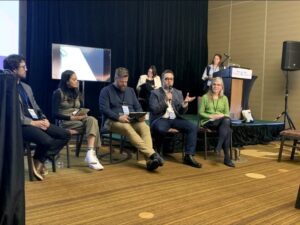
About 40 people attended MEOPAR’s session at the ORCA Meeting on coastal community resilience, where we discussed how Canadian coastal communities are responding to and preparing for climate change.
Newfoundland Municipalities’ Kathleen Parewick highlighted climate change adaptation capacity. Evan Andrews from Memorial University of Newfoundland, Marc-Olivier Massé from CERMIM, Sepehr Khosravi from CLIMAtlantic, and Amanda Lim from Shorefast Foundation participated in the panel discussion following her talk (pictured right).
As the panel discussion unfolded, Meghan Callon, COLC’s Communications and Design Lead, created a visual graphic (below).
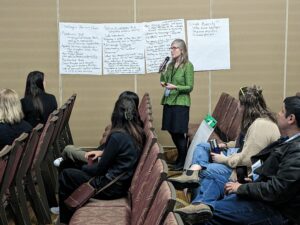 The panel discussion recognized the importance of engaging the right stakeholders and involving them in decision-making processes. In order to solve complex problems, emerging practitioners need access to academic resources. During the workshop component, participants identified existing strengths and bright spots in community-led science addressing climate change resilience. Future opportunities, challenges, and research gaps were also discussed.
The panel discussion recognized the importance of engaging the right stakeholders and involving them in decision-making processes. In order to solve complex problems, emerging practitioners need access to academic resources. During the workshop component, participants identified existing strengths and bright spots in community-led science addressing climate change resilience. Future opportunities, challenges, and research gaps were also discussed.
In order to mobilize knowledge, meaningful dialogue and relationships were emphasized to assist communities in problem-solving. It also highlighted restorative justice, which emphasizes reconciliation, healing, and community development. Aside from environmental concerns, coastal erosion affects transportation infrastructure and access to essential services. Food security and sovereignty are key concerns for island communities. Community collaboration often motivates communities to find long-term solutions after disasters. As extreme events become more frequent and intense, adaptive solutions were recommended rather than definitive ones. It is easier to learn and adjust when challenges are acknowledged as continuing and cyclical. Climate change resilience depends on meaningful collaboration. With shared understanding, capacity building, and restorative justice, coastal communities can develop adaptive solutions tailored to their unique contexts and needs.
Vessels Needed for the Science Wanted
During the second day of the ORCA Meeting, MEOPAR hosted a panel discussion to address the scientific vessel capacity needs in Canada (captured in the poster). The discussion involved 50 stakeholders from the ocean research community and focused on future opportunities and requirements for vessel access, and was Moderated by Dr. Doug Wallace, MEOPAR’s Scientific Director (pictured below).
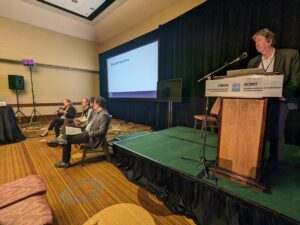 The panelists represented various sectors and regions in Canada and shared their perspectives on the vessels needed for scientific research:
The panelists represented various sectors and regions in Canada and shared their perspectives on the vessels needed for scientific research:
- Alexandre Forest, Executive Director, Amundsen Science
- Heather Reader, Assistant Professor Canada Research Chair in Chemistry of the Ocean and Atmosphere, Department of Chemistry Memorial University of Newfoundland
- Guillaume St. Onge, directeur de l’Institut des sciences de la mer de Rimouski (ISMER) de l’Université du Québec à Rimouski (UQAR), préside le conseil d’administration de Reformar
- Marc Olivier Masse, Associate Director, Centre de research sur les milieux insulaires maritimes (CERMIM)
- Benoit Pirenne, Director of User Engagement, Ocean Networks Canada
Challenges related to vessel access were discussed, including issues with applications, funding, and aging ships. Possible solutions were proposed, such as leveraging government grants, creating partnerships between academia and government agencies, and providing training opportunities for researchers. The importance of international collaborations and coordination with other interested groups was also emphasized. The session concluded by encouraging participants to join the National Research Vessel Task Team (NRVTT) and contribute to finding solutions for scientific vessel needs.
Integrating Canadian Predictive Modelling Activities: A panel discussion with MEOPAR, CONCEPTS, and CoastPredict
This session focused on collaborations among Canadian ocean numerical modeling groups. As part of the session, Paul Myers (CNC-SCOR Chair, MEOPAR Prediction Core Chair) and Doug Wallace (Lead PI and Scientific Director of MEOPAR) presented the UN Decade-endorsed Coast Predict Initiative. International links with UN-endorsed prediction activities were also discussed. Afterward, the presentation shifted to another UN Decade-endorsed activity, Future Coastal Ocean Climates (FLAME). As part of FLAME, an ECOP presentation was presented by Anna Katavouta from the National Oceanographic Centre, Liverpool, UK. Finally, the session reviewed the collaboration between CONCEPTS and MEOPAR’s Prediction Core in NEMO modeling. This led to an open discussion about how to move these efforts forward. This session concluded with the audience agreeing that these topics were important and that further discussion was needed in these areas.
Building Waves of Collaboration
The ORCA National Meeting was a success for MEOPAR and demonstrated the importance of collaboration and conversation for ocean science’s future. It was a pleasure engaging with our network and participating in national discussions to advance the Ocean Decade’s goals. We hope that our efforts have helped to raise awareness and spur action to protect the oceans and the critical role they play in mitigating climate change and providing food security. Through collective action and coordinated research, we can ensure a healthier and more sustainable ocean future.
Questions? Email alexa.goodman@meopar.ca

